Our Sacred Honor (A Luke Stone Thriller—Book 6) Read online
Page 7
She turned and faced Luke. “I learned a lot about myself, things I needed to learn.”
“Name a big one,” Luke said.
She smiled. “I learned that I don’t need to give myself away to older men anymore. What was I looking for, protection? Approval? It was a silly, little girl habit. I’ve been sticking with men my own age or younger the past couple of years, and it’s been pretty nice. I’ve decided I prefer men who aren’t trying to teach me anything.”
Ouch. Now Luke smiled. Words, however, seemed to escape him.
“I also learned I was a survivor.”
“That’s big,” Luke said.
“Yeah,” she said. “But not as big as the man thing.”
CHAPTER TWELVE
1:45 p.m. Eastern Standard Time
The Situation Room
The White House, Washington, DC
“What time is it there?” Susan said.
Kurt looked at his watch. “Ah, about a quarter to nine at night. We’re scheduled to talk to him at nine.”
Susan nodded. “Okay. Give me the elevator pitch.”
She looked around the room, packed as usual. Kurt stood at the far end of the oblong table, in his customary position. Haley Lawrence sat at the table among a sea of generals and admirals, a few of them women, Susan was gratified to notice. The edges of the room were full of aides and assistants.
“We’ve got a crisis unfolding,” Kurt said. “And we’ve got to step carefully. That’s the message.”
Susan made a spinning motion with her hand, as if to say, Get on with it.
“As most people here will know, Israel has been a strategic ally of ours since its founding in 1948. In a constantly changing world, only a handful of countries—England, Canada, France, India, Saudi Arabia…”
Kurt waited and rolled his eyes as a few people booed the mention of the Saudis.
“…Morocco, a few others—have been with us longer. As a relatively small country in a volatile region, Israel’s position is tenuous at best, and over the decades tensions have repeatedly erupted into open conflict with a host of regional actors. In the early days, these conflicts were the result of attacks by neighboring countries such as Egypt, Jordan, and Syria. In more recent years, the conflicts have focused on the plight of the Palestinians who were displaced when Israel was created, and who live in a sort of political limbo in the West Bank and the Gaza Strip, lands that Israel seized during the Six Day War in 1967. Every international body, indeed every country on Earth besides Israel and United States, considers Israel the occupying power in these territories.
“Islamic terrorist organizations have been using this situation as a fundraising tool for two generations. Also, Muslim countries can whip up anti-Israel sentiment any time it fits their purposes, as long as the Palestinians remain in limbo.”
“What is our policy on this?” someone along the back asked.
Kurt nodded. “Sure, good question. Just so we’re all clear. Our official policy is that there is an ongoing negotiation, the result of which will be that the West Bank and Gaza eventually become a country, probably called Palestine, and that Palestine and Israel will co-exist peacefully and may even become regional partners. In the meantime, we recognize Israel’s right to secure its borders and prevent attacks by Palestinians on Israeli civilians. We do not recognize Israel’s right to build so-called settlements in Palestinian territory, nor do we recognize Jerusalem as the capital of Israel. We consider it a partitioned city—the western half in Israel, the eastern half in the West Bank.”
“And Yonatan?”
Kurt glanced at a sheet of paper on the table in front of him. “Yonatan Stern. Sixty-three years old. Married, father of five, grandfather of eight. As a young man, he was a commando with the elite Sayeret Matkal unit of the Israeli Defense Forces. In 1976, he was one of the leaders of the successful raid on Entebbe Airport in Uganda, where Israeli commandos rescued more than one hundred Israeli hostages taken from a hijacked plane.
“Since he left the military, he has spent almost his entire adult life in Israeli politics as a war hawk and a hardliner. At the moment, he appears to sit atop an unassailable majority in the Knesset. His vulnerability is that he is currently the subject of at least four separate police investigations into corruption—ranging from receiving hundreds of thousands of dollars’ worth of gifts from wealthy supporters, all the way up to doling out preferential no-bid government military contracts and manipulating the Israeli telecom industry on behalf of friends.”
Kurt shook his head and whistled. “Stern is in legal jeopardy. It’s real, and it has been consuming much of his attention in recent months. He’ll be lucky to stay out of jail. And he has problems on the diplomatic front as well. While traveling in Europe three weeks ago, he was caught speaking into an open microphone, joking about the idea of a two-state solution with the Palestinians, seeming to dismiss it out of hand. Apparently, he didn’t know the mic was on, and he said the European Union was crazy—yes, he used the word crazy—for worrying about the Palestinians. You can imagine how well this little faux pas has played in European capitals and among the Israeli left wing.”
He looked at Susan. “To be clear, Yonatan Stern is not an ideal partner. But I think we also need to recognize that he isn’t Prime Minister for life, and there are many, many elements in Israeli society that are seeking a peaceful solution to the ongoing problems. Israel has been, and continues to be, an important ally of the United States, and their civilian population is under attack. There is no telling at this moment what the extent of that attack is likely to be. But if Iran has nuclear weapons, as they claim…”
Susan nodded. “Of course. My problem isn’t with Israel. I understand the relationship is much larger than Yonatan.”
“Good. All we need from him at this moment is restraint, which is not necessarily his strong suit. He’s a hammer, and everywhere he looks, he sees nails. But he has to give us time to find and eliminate those nukes. Shall we talk to him?”
She shrugged. “Let’s do it.”
* * *
“I hope you’re happy.”
Yonatan Stern’s deep disembodied rumble came over the black speakerphone device at the center of the conference table. “I hope this pleases you.”
Susan looked at Kurt and shook her head.
“Why would this please me, Yonatan?”
“I think it should be obvious,” he said.
“It isn’t.”
“Your country, at your personal urging, sought an appeasement with Iran, continuing to allow them to refine uranium. The Europeans went along with you. And this is the result—an Iran that is willing to claim it has nuclear weapons, in defiance of all international agreements. An Iran that is happy to put the most advanced conventional weapons it has into the hands of terrorists—maniacs who are accountable to no one.”
“Yonatan…” Susan began.
“There are hundreds dead here, Susan. Perhaps thousands. We don’t even know yet. Residential buildings have been completely destroyed, and rescuers can only slowly dig through the rubble for fear of further collapses. There was a firestorm in a neighborhood in Haifa. The hospitals everywhere are overwhelmed.”
Susan shook her head. “I’m very sorry.”
It was as if Stern hadn’t heard her. “We are facing, perhaps for the first time since 1973, the question of annihilation. Now, I’m sure you think that the situation is more complicated than what I describe. Isn’t that what the Americans always say? Oh my, Israel and Iran, Israel and Hezbollah, what a complicated situation! But it’s not complicated. It’s simple. You have unleashed Iran upon us. You did it. And now you ask us to hold back our response. For decades you have tolerated a failed state in Lebanon and called it your ally. Lebanon is a launch platform for Iranian terror attacks—nothing more, nothing less. It is not a country. And yet you ask us—”
Susan tried again. “Yonatan—”
His deep voice rose an octave. “Listen! Please listen t
o me. Will you listen? It’s not your cities being bombed. It’s not your friends and loved ones crushed under rubble or burning in fire. You do not know what is happening here.”
“Yonatan,” Susan said, “I’ve been burned in fire and crushed under rubble. I’ve seen my friends and colleagues burned alive in a firestorm. One of my best friends was shot and killed in front of my own eyes. I’ve been shot myself. I know what is happening there. I wish I didn’t.”
There was a pause over the line.
“Yonatan?”
“Okay,” he said. “Okay.”
There was another long pause. In the background, Susan could hear people in the room with Yonatan, speaking to each other in Hebrew.
“We can put the genie back in the bottle,” she said.
“How can we do that?”
Susan took the plunge. “A unilateral ceasefire,” she said, knowing how that would sound. But she had to start somewhere. “It will put pressure on both Hezbollah and Iran to stop the hostilities.”
She could almost see him shaking his head.
“Impossible. My hands are tied on that score, even if I wanted to do it, which I do not. There is no pressuring Hezbollah, as you seem to believe. The only pressure they understand is force. We cannot stop while they continue to launch missiles into our territory. We cannot stop while they hold Daria Shalit. We cannot stop while our cities burn. There is such a thing as public opinion here, Susan, and I was elected because I pledged to protect my people.”
“You’re not going to win this by attacking Hezbollah,” Susan said. “And if you attack Iran, all bets are off. Listen, we have sent you two of our best covert operatives, along with members of their intelligence team. There is a plan being cooked up between Mossad, the CIA, and my own Special Response Team.”
She did not say, “The man I love is going to risk his life for you.”
“I am aware of the plan,” Yonatan said. “I must tell you that I am very skeptical of it. We have sent many undercover operatives into Iran, and we have lost—”
Susan did not want to hear that. “If the operation is successful, we will discover the location of the nuclear weapons, if they exist. Then we will go in and destroy them. We will inform that Russians and Chinese of our intentions to do so, and invite them to participate with us. As you know, all parties have agreed that Iran is not to have nuclear weapons. Those agreements are still in force.”
“Susan, I wish I shared your enthusiasm for international agreements, and for secret missions. In Israel, we have some of the best, most highly trained covert operatives on Earth, and our secret missions fail as often as they succeed.”
“Will you do it, though?” Susan said. This was where she normally excelled—the closing. “Will you wait? No matter what happens, no matter what they hit you with, will you hold off an attack, and give the mission a chance?”
Yonatan spoke in Hebrew to someone in the room with him. The man responded at length. Yonatan spoke again. The man responded again.
“Yonatan?” Susan said.
“I will,” Yonatan said, “take your idea under advisement.”
CHAPTER THIRTEEN
December 13
4:45 a.m. Israel Time (9:45 p.m. Eastern Standard Time on December 12)
Tel Aviv, Israel
“I don’t know if anyone is going to believe that we’re diplomats,” Swann said. He hovered over Luke, holding a smartphone near his face. Luke could barely focus on it. He glanced up at Swann, with his crazy glasses, his ponytail, and his black RAMONES T-shirt. Was this what diplomats looked like?
“Yeah? Why’s that?”
“Almost the entire embassy staff has just received evacuation orders. They’re going to Cyprus, beginning in an hour from now.”
Luke smiled. He looked around at the rooftop bar at the Hilton Tel Aviv. The place was hopping.
It didn’t matter that it was nearly five in the morning, and the first pink light of the sun was beginning to appear. It didn’t matter that the law technically forbade serving alcohol this time of day. It didn’t matter that there was a war on.
Indeed, this last was the reason the place was still going. War correspondents liked to drink, and they didn’t like it when the bars closed. The roof, which was normally a good place to catch views of the sea a few blocks away, and the mountains to the east, was now a good place to catch the light show to the north. It looked like the Fourth of July up there. Whether it was Israeli northern towns getting hit, or southern Lebanon Hezbollah bunkers and gun emplacements, was impossible to tell from here.
Several TV news people had already filmed segments standing in front of the railing at the north side of the balcony, with explosions going on behind them. Most of Europe was asleep right now, but back in the United States, it was still prime time.
Luke sat at a table with Trudy, picking over a plastic plate with falafel, hummus, French fries, and a salad made of finely diced tomato, onion, cucumber, and chili peppers, with lemon juice and olive oil. It was a frustrating delay. As tired as Luke was, he was anxious to get a move on. He had yet to go on a mission that benefited from waiting around.
Ed and Swann were nearby, standing at the bar amidst the flak-jacketed reporters, cameramen, and various other war junkies. The set-up here was pretty good. The food wasn’t bad. This high up, the sea breeze was very nice. You could just hear the rumble of the explosions in the distance. A few of them—the closest ones—shook the building.
“Don’t worry,” he said as he noticed Trudy’s eyes widen. “Israel is prone to earthquakes. Modern buildings like this one have to meet stringent codes.”
“I’m not worried about the building falling down from a tremor,” Trudy said. “I’m more worried about a missile hitting it.”
Luke nodded. “There is that possibility.”
On the drive here, they had seen the damage sustained from yesterday’s missile strikes. A few buildings were still on fire. Streets were destroyed—giant klieg lights illuminating the rescue efforts as crowds of soldiers and construction crews dug through the rubble, looking for survivors. Ambulances sped down city streets, sirens roaring, bringing people pulled from the earth to the hospitals. Police checkpoints were everywhere. Candlelight vigils—prayer circles—were nearly as common.
Luke had taken a Dexedrine a little while ago, swallowing it with a beer, and its effects were starting to kick in. That, combined with the food in his stomach and the little bit of beer he had sipped, was having an effect on his mood.
He was starting to feel good.
“Luke, I want to ask you something,” Trudy said.
He shrugged. “Shoot.”
It felt a little odd to be here with Trudy. She was the best in the business at what she did—intelligence gathering and scenario spinning. She brought a sort of freewheeling creativity to it that most other people did not. People got hemmed in by data—what it said, what it didn’t say. Trudy wasn’t like that. She took leaps of faith. He liked that about her. She was…
Indispensable.
If that weren’t true, he probably would have kept his distance from her. She certainly wouldn’t be here with them now. Given all her baggage, and their history together, he might not even have hired her again.
“Are you sleeping with the President of the United States?” Trudy said.
Luke shrugged. “What could possibly give you that idea?”
Trudy nodded. “So you are. Okay. I’m not jealous, if that’s what you think. I just worry about you.”
Luke looked at her. She was beautiful. As beautiful as Susan Hopkins was at her age? Maybe, maybe not. But Luke tended to think that parsing gradations of beauty was a lot like trying to split strands of hair lengthwise with a large knife.
“I get that a lot,” Luke said. “People worrying about me. What makes you worry?”
“You’ve spent most of your life in secrecy, Luke. In recent years, people in the wider world have begun to know who you are. But you’re a hundred miles fro
m being famous, and you’re on the other side of the galaxy from the kind of fame Susan has. Just about everyone on Earth knows who she is.”
Luke nodded. “True enough. Susan is one of the most famous people in the world.”
“Right,” Trudy said. “She might even be number one. And she’s been famous since she was a teenager. She’s used to that kind of scrutiny. But you aren’t. And you’ve been involved in a lot of operations, some of which…”
There was a long pause as she seemed to search for the right words.
Luke shrugged. “Just say it. I don’t get my feelings hurt that easily.”
“Some of which could be considered war crimes,” she said. “Some of which could be considered extrajudicial murders. Torture. Actions, like mock executions, that are against the Geneva Conventions. Insubordination. Impersonations. Actions that exceeded your authority. Actions that subverted the chain of command. Actions where there was significant collateral damage. Actions that… well, let’s put it this way: you carried out at least one high-level assassination that was not ordered by anyone, and could have destabilized an entire region.”
Luke sighed, just a touch under his breath. He launched into the official explanation, the one Trudy well knew. “Uh, generally speaking, I’ve been granted wide latitude to take actions that produce results in line with the…”
Trudy shook her head. “You don’t get it, Luke. I’m not criticizing you. I know why you do the things you do. But if they ever came out, it would look bad. Really, really bad. Most Americans don’t know what the government does in their name, and most don’t want to know.”

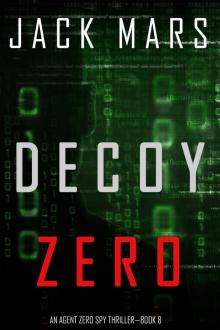 Decoy Zero
Decoy Zero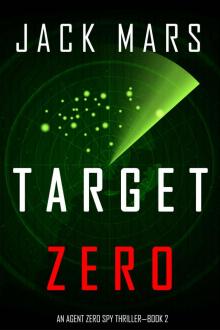 Target Zero
Target Zero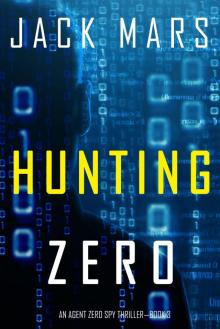 Hunting Zero
Hunting Zero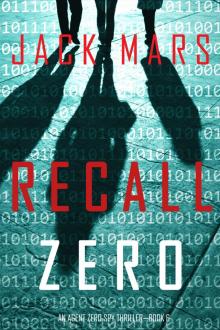 Recall Zero
Recall Zero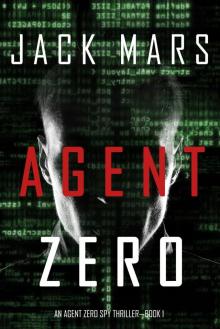 Agent Zero
Agent Zero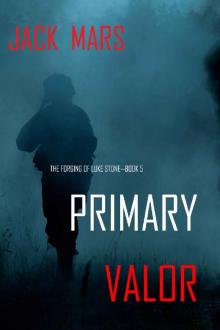 Primary Valor
Primary Valor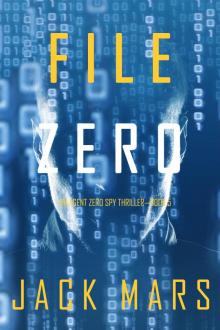 File Zero
File Zero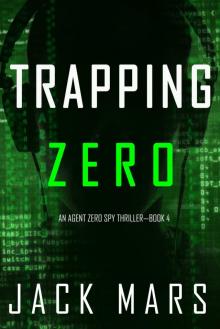 Trapping Zero
Trapping Zero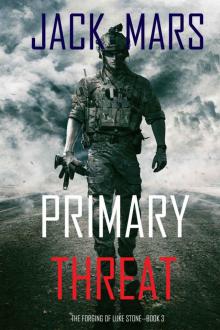 Primary Threat
Primary Threat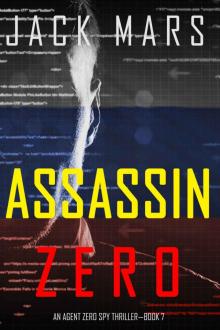 Assassin Zero
Assassin Zero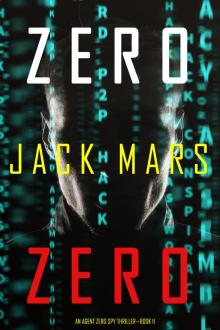 Zero Zero
Zero Zero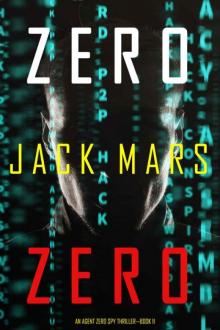 Zero Zero (An Agent Zero Spy Thriller—Book #11)
Zero Zero (An Agent Zero Spy Thriller—Book #11)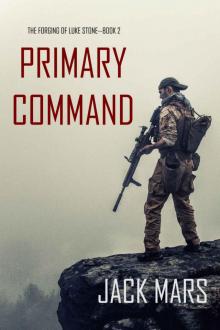 Primary Command
Primary Command![[Luke Stone 02.0] Oath of Office Read online](http://i1.bookreadfree.com/i/03/21/luke_stone_02_0_oath_of_office_preview.jpg) [Luke Stone 02.0] Oath of Office
[Luke Stone 02.0] Oath of Office House Divided
House Divided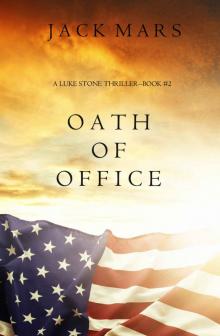 Oath of Office (a Luke Stone Thriller—Book #2)
Oath of Office (a Luke Stone Thriller—Book #2) Our Sacred Honor (A Luke Stone Thriller—Book 6)
Our Sacred Honor (A Luke Stone Thriller—Book 6)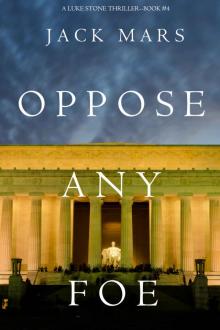 Luke Stone 04 - Oppose Any Foe
Luke Stone 04 - Oppose Any Foe Our Sacred Honor
Our Sacred Honor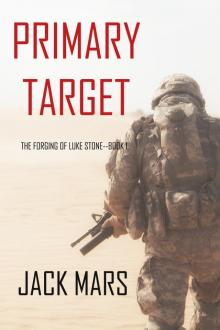 Primary Target
Primary Target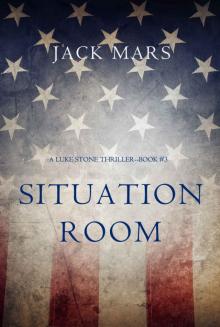 Luke Stone 03 - Situation Room
Luke Stone 03 - Situation Room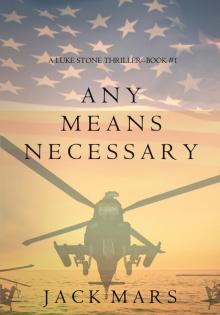 Any Means Necessary: A Luke Stone Thriller (Book 1)
Any Means Necessary: A Luke Stone Thriller (Book 1)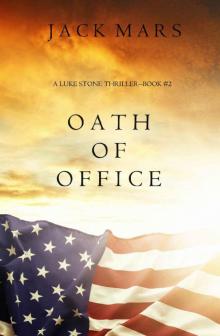 Oath of Office
Oath of Office